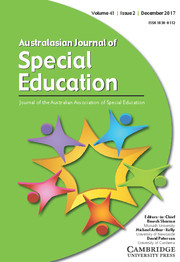Article contents
Adaptation of an Interview-Based Protocol to Examine Close Relationships Between Children With Developmental Disabilities and Peers
Published online by Cambridge University Press: 02 March 2012
Abstract
The purpose of this study was to determine whether an interview protocol, based on the Friendship Quality Questionnaire, could be adapted to examine the close relationships of children with developmental disabilities in an inclusive school setting. Twenty-five children with developmental disabilities aged between approximately 5 and 12 years participated and their relationships with 74 peers were examined. Several adaptations to the procedures and interview instrument were evaluated, including gathering interview data from multiple sources and the development of a short form of the interview questionnaire. Overall, the adaptations to procedures used in the current study appeared successful in catering for the wide range of abilities and ages among respondents. This was reflected in the reliability of children's responses, high response rates on the short interview form, and good correspondence between the short and full interview forms. The described adaptations were successful in eliciting information on aspects of children's relationships that might not have been obtained using a traditional interview instrument. This opens the way for further detailed quantitative evaluation of relationships between children with developmental disabilities and peers in inclusive settings.
Information
- Type
- Articles
- Information
- Copyright
- Copyright © Cambridge University Press 2010
- 6
- Cited by

